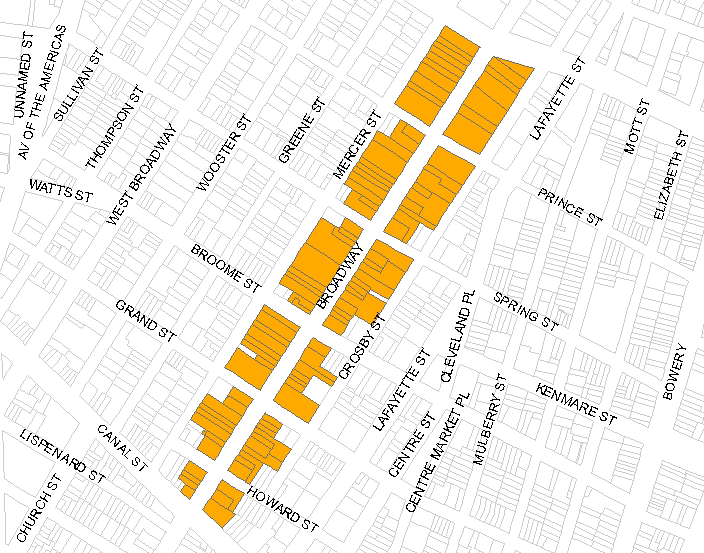Proposal encompasses 800 businesses and features unique reimbursement plan for certain mixed-use co-ops. On January 26, 2011, the City Planning Commission approved the Department of Small Business Services’ plan to create the SoHo Business Improvement District for approximately 800 businesses and 433 residential units in Manhattan. The BID would include 280 tax lots along Broadway between Houston Street and Canal Street. The BID would include a special reimbursement plan for seven mixed-use co-ops in response to concerns about the annual assessment on those properties.
The BID’s boundaries encompass a mix of uses including art galleries and retail shops. The area is primarily characterized by five- to twelve-story residential loft buildings with ground floor commercial uses and live-work quarters for artists on the upper floors. The BID’s projected first-year budget would be $700,000. Wholly commercial properties and ground floor commercial condominiums would be assessed based on a combination of a linear front footage rate, an assessed value rate, and a base fee of $250. Mixed-use properties, including co-ops, would be assessed the same way in which commercial properties are assessed, but using a reduced assessed value rate to reflect the upper floor residential use. Commercial condos located on an upper floor or below-grade space would be assessed based on an assessed value rate plus a base fee of $250. Wholly residential tax lots would pay an annual one-dollar assessment.
Manhattan Community Board 2 opposed the BID, citing concerns that residential condo and co-op owners would be treated unequally. CB 2 stated that the plan lacked a mechanism to ensure that residents in some mixed-use co-ops with ground floor commercial space would not be responsible for more than a nominal residential assessment of one dollar
The City treats co-ops as single tax lots when calculating BID assessments. Seven mixed-use co-ops within the proposed BID own and control their building’s commercial ground floor space as a corporation. The corporation leases the space and would be able to offset the commercial BID assessment with the rental income. In seven other mixed-use co-ops the commercial space is not owned and controlled by the corporation, but by an individual co-op shareholder. There would be no rental income available for these co-ops to offset the commercial BID assessment.
At the Commission’s hearing, Brian Steinwurtzel, co-chair of the SoHo BID Steering Committee, explained that a unique residential reimbursement plan would be provided to address CB 2’s concerns. The reimbursement plan would only apply to the seven mixed-use co-ops that do not own their commercial space as a corporation and would ensure that the residential portion of the co-op would not pay more than the one dollar paid by wholly residential tax lots.
The Commission approved the proposal. Noting that commercial property owners and their tenants should be responsible for the majority of a BID’s costs, the Commission recommended that the City Council modify the proposal to reflect the residential reimbursement plan. The Commission also recommended that the budget be modified to provide greater specificity as to how the BID will allocate funds for marketing, promotion, and advertising
CPC: SoHo BID (N 110128 BDM) (Jan. 26, 2011).


